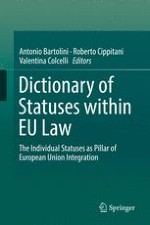
2019 | OriginalPaper | Chapter
Introduction
Authors : Antonio Bartolini, Roberto Cippitani, Valentina Colcelli
Published in: Dictionary of Statuses within EU Law
Publisher: Springer International Publishing
Activate our intelligent search to find suitable subject content or patents.
Select sections of text to find matching patents with Artificial Intelligence. powered by
Select sections of text to find additional relevant content using AI-assisted search. powered by